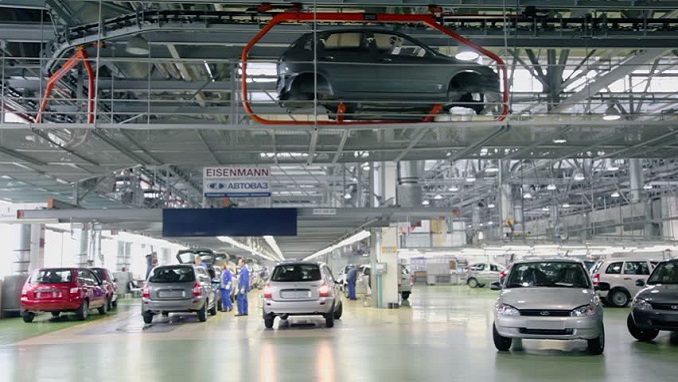In Tolyatti, a city of 700,000 people on the Volga River dubbed “Russia’s Detroit“, dozens of workshops producing Ladas, Renaults, Nissans, and Datsuns, are still the core of Russia’s automobile industry.
A reportage from car maker AvtoVAZ, originally published by Russian website Socialist.news, reveals the human cost of overtime and overwork at the city’s principal employer. Russian car workers, weakly organized and unprotected, face significant exploitation at the hands of management.
At the end of November, a 58-year-old man died at Tolyatti’s AvtoVAZ car plant after a 12-hour shift. His colleagues said that he couldn’t take the extra shifts. Workers at other parts of the plant confirmed that they often do overtime and weekend shifts.
Anna Perova, a worker at AvtoVAZ, also had an accident at her workplace. Five years ago, her fingers were ripped off her right hand. A rod had fallen out of the control unit of the press she was using, but as soon as Anna decided to fix it, the press started working all by itself. Anna whipped her hand out of the press, but her fingers had been stamped into the glove she was wearing.
An inspection at the factory revealed that the equipment Anna had been using was defective, even though it had been repaired. But the factory management didn’t admit wrongdoing. Perova decided to go to court, but the judge decided to consider the loss of Anna’s fingers a “light” injury and ordered the factory to pay her 50,000 roubles (£627) compensation. “This would be 50,000 euros abroad,” Perova said in court, but no one listened to her. Perova could no longer work in a workshop making roofs, doors and other parts for cars. Her monthly wage was cut by more than half, from 25,000 roubles (£313) to 14,000 (£175) – you’ll have less work to do now, they said.
Take a look at your hand, and imagine that Anna has nothing up to the knuckle. Perova believes she was lucky. In the same workshop, six months later, one worker lost three fingers to the press. Another lost her whole hand.
“People here work 12 hours a day, six days a week, and this leads to overwork and injuries. People are afraid of the consequences, they hide their injuries. Last year, a woman tripped on a waste pipe and fell on her back, she didn’t tell anyone – she took pity on the engineer responsible. Her spine was injured to the point where she spent two months in bed. A year later, she died. The engineer retired, and she went to the grave.”
In an economy struggling with unemployment, many workers are afraid that they would be fired if they raise their voice about the working conditions, Anna says.
“They worry that they won’t get work, they’ll be fired for something. That’d be fine at a small business, but this is AvtoVAZ! So many people are killed. One lad dropped from a chimney at the factory while he was cleaning the windows. They paid his parents 300,000 roubles [£3,700] compensation.”
Workers say that visits by high-ranking officials to AvtoVAZ are the only way of leaving the factory early. Workers tell us that, when Vladimir Putin or Dmitry Medvedev visit, the factory is painted white and cleaned up, and they’re let go an hour earlier.
On 17 January, AvtoVAZ workers reported in a social media group that Alexander Shatalov, a cutter at the factory, had died overnight. They were forbidden from stopping production. The worker’s body lay covered in the shop until morning. One anonymous author commented: “Even the dead work overtime at AvtoVAZ”.












